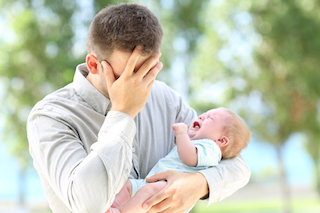 While you might have heard of maternal postpartum depression, a mood disorder experienced by up to 20 per cent of women after they’ve had a baby, paternal postpartum depression also exists but isn’t as widely talked about.
While you might have heard of maternal postpartum depression, a mood disorder experienced by up to 20 per cent of women after they’ve had a baby, paternal postpartum depression also exists but isn’t as widely talked about.
Studies have shown fatherhood to have a positive influence on men’s health, however, a new study published in the Journal of Midwifery has found that a lack of paternity leave among other factors, puts dads at a higher risk of developing the very real illness known as paternal postpartum depression.
The question often arises when the topic of paternal postpartum depression is raised as to how it can be possible for men to suffer from postpartum depression when it’s the woman who just went through the tremendous physical procedure of giving birth to a new human being, one that spent the past nine months growing and forming inside her body, causing all kinds of hormonal changes.
“Previously, it was perceived as a product of hormonal changes and consequently, most of the research focused on mothers,” note the current study’s authors. “However, it is now established that postnatal depression is also the product of psychosocial causes.”
There has been some research on paternal postpartum depression, though not much. Over the past decade, studies have shown the prevalence of paternal postpartum depression to be somewhere in the range of 1 to 27 per cent which is quite large. Thanks to one study which looked at the average of all studies on paternal postpartum depression, the average prevalence rate was determined to be around 8.4 per cent, higher than the rate of general men’s depression at 4.7 per cent.
Previous studies have also found that men with female partners who have been diagnosed with maternal postpartum depression are 2.5 times likelier to be diagnosed with paternal postpartum depression at six weeks postpartum.
“There is a need to focus on the mental health of fathers as well as mothers during the perinatal period, as fathers currently are underscreened, underdiagnosed and undertreated for mental health problems,” note the study’s authors.
The study took place in Ireland. One hundred new fathers with an infant less than a year old participated in the study, the men ranging in age from 24 to 50. Researchers used the Edinburgh Postnatal Depression Scale (EPDS) to evaluate whether the fathers had postpartum depression and found the prevalence rate to be 28 per cent with a cut off score of nine or above, and 12 per cent with a cut off score of 12 or above.
The EPDS was originally designed to evaluate mothers who might be experiencing postpartum depression and the traditional cut off score is 13 or higher. A lower cut off score has been recommended for men because men have been found to express themselves differently than women, i.e., they hold back their true feelings when it comes to their emotional wellbeing.
In addition to the EPDS, dads also answered questions about their socio-demographics, physical and mental health history, infant health and sleep problems, their partner’s physical and mental health along with the extent to which they were receiving any social support.
“The factors found to increase the risk of paternal postnatal depression included having an infant with sleep problems, a previous history of depression, a lack of social support, poor economic circumstances, not having paternity leave and not being married,” note the study’s authors. "Fathers who self-reported that they were struggling to survive financially, had a greater risk of postnatal depression compared to those who were financially comfortable."
So what does it mean to the family unit when a father is diagnosed with postpartum depression? According to research, when a dad is suffering, responsibilities at home and work are affected as he experiences fatigue, stress, anxiety and an increased risk of suicide. He can also be less sensitive and less responsive to other family members such as the new infant and his partner who may also be dealing with postpartum depression. He may also become hostile.
You can imagine that the effects on the new baby of having a father and potentially a mother both suffering from postpartum depression. Studies have shown babies of depressed parents to have emotional issues growing up as well as increased risk of conduct disorder and hyperactivity. Babies are also more likely to experience less bonding with their parents, and may experience physical violence.
“The results add to the growing body of evidence that paternal postnatal mental health is a significant public health issue, and indicates a need for assessment and support for fathers during this life stage,” conclude the study’s authors.
Patricia Tomasi is a mom, maternal mental health advocate, journalist, and speaker. She writes regularly for the Huffington Post Canada, focusing primarily on maternal mental health after suffering from severe postpartum anxiety twice. You can find her Huffington Post biography here. Patricia is also a Patient Expert Advisor for the North American-based, Maternal Mental Health Research Collective and is the founder of the online peer support group - Facebook Postpartum Depression & Anxiety Support Group - with over 1500 members worldwide. Blog: www.patriciatomasiblog.wordpress.com
Email: tomasi.patricia@gmail.com